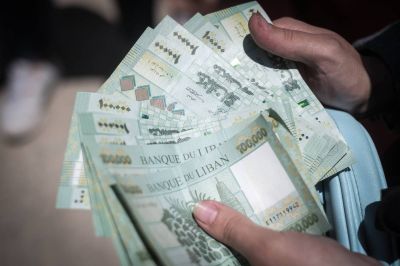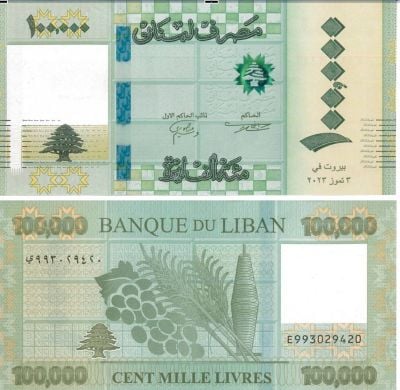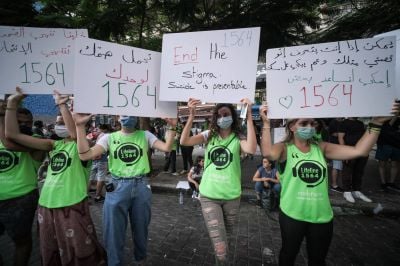
UNDP Lebanon's Resident Representative Melanie Hauenstein (left) and UNDP's regional director Abdallah al-Dardari (right) speak at a press conference in Beirut on Dec. 19, 2023. (Credit: Rana Swaidan/UNDP Lebanon handout photo)
BEIRUT — Lebanon, Jordan and Egypt each stand to lose two to four percent of their gross domestic product (GDP) due to the war in Gaza, with Lebanon at particular economic risk, the United Nations Development Programme (UNDP) said Tuesday, revealing the preliminary findings of a report on the economic impacts of the conflict.
Such a drop in GDP in the nearly three months since Oct. 7, when the war began, would constitute “a massive loss,” said UNDP regional director Abdallah al-Dardari at a Beirut press conference.
He added that Lebanon — already in the midst of a historic economic crisis that has seen its national currency plummet and inflation snowball — is too fragile to handle more shocks.
UNDP has not yet observed “any noticeable impact on [Lebanon’s] inflation yet” due to the war,” but there is a reduced demand in the economy with consumption going down,” Dardari told L’Orient Today at Tuesday’s press conference. “This could potentially slow inflation down.”
Since the start of the war in early October, Israeli forces have unleashed a deadly bombardment campaign on the Gaza Strip, killing nearly 20,000 people — almost half of them children — and injuring tens of thousands under the guise of rooting out Hamas.
The fighting has also spread to Lebanon, where cross-border fighting between Hezbollah and Israel since October has also killed dozens and forced thousands of residents to flee for safety.
That has meant plummeting income for the crucial tourism sector in Lebanon, where “October 2023 [...] recorded more departures than arrivals and a 15 percent decrease in the inflow of passengers compared to October 2022,” according to the UNDP report’s preliminary data.
With incoming flights to Lebanon down, crucial remittances from abroad — a necessity after the collapse of the country’s banking sector — could also decrease as a result of the war, the UNDP said.
The war’s impacts on international trade and supply chains are likely to further hinder Lebanon’s efforts to recover from its economic downturn.
Southern Lebanon
Southern Lebanon, where the agricultural sector constitutes 80 percent of the local GDP, has experienced significant losses during a critical harvest season, the UNDP reported.
With around 91 villages subject to cross-border attacks from Israeli forces since the start of the war, more than 64,000 people have been displaced and dozens of buildings completely destroyed. Infrastructure and economic and social services have been significantly disrupted.
Air pollution has additionally increased because of Israeli shelling in the south — also affecting water and soil quality, which could have long-term environmental impacts. “The toxic compounds from explosive weapons, with white phosphorus usage, further reduces fertility [of farmland] and increases soil acidity,” the report found.
White phosphorus munitions are restricted under international humanitarian law.
Nearly 50,000 olive trees were reported to have been burnt by Israeli phosphorus bombs, consequently disrupting seasonal olive oil production. Other produce such as carob, grains and winter crops have reportedly been affected, too.
Other loss estimates
Some estimates have forecasted even larger losses for Lebanon’s economy amid the war.
In a November report, S&P Global Ratings predicted that decreased tourism in Lebanon could cause a loss of up to 23 percent of the country’s GDP should the war continue.
A previous report by the International Institute of Finance (IIF) estimated Lebanon’s GDP to contract by 0.5 percent in 2023 and four percent in 2024, should the war remain under control.
In case of further escalation, the IFF predicted a one percent decline in GDP by the end of 2023 and a 30 percent decline in 2024.
There are no signs yet that the war and bombardment in Gaza will soon cease, despite a temporary ceasefire in November and multiple international efforts toward an end to the hostilities.
A UN Security Council vote on calling for a Gaza ceasefire was scheduled for Monday but postponed until Tuesday due to US objections to the language of the initial text.


